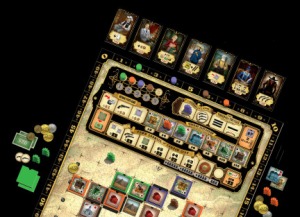Review: Carson City
Posted by James (admin) on October 31st, 2009
 Upon reading the rules prior to Spiel 09, Carson City sounded interesting and I pre-ordered it. I wasn’t disappointed either as the game delivered a close run contest with some very interesting choices.
Upon reading the rules prior to Spiel 09, Carson City sounded interesting and I pre-ordered it. I wasn’t disappointed either as the game delivered a close run contest with some very interesting choices.
ACTIONS
Together, but not co-operatively, players build Carson City. Each turn, players select a unique role and then spend their cowboy meeple (one at a time) to claim actions. Actions allow players to gain resources, buy buildings, hire additional meeple, and even gain victory points. However, actions only get resolved after players have committed their meeple. Plus, apart from the two default actions, only one player can perform each action.
If two or more players want to perform the same action they must commit their meeple first and then duel for it when the time comes. So, players that lose a duel will not get to perform that action.
As a result, this claiming of actions is very tense. You need to pick your actions carefully, consider what others will do, and even the timing of when you claim is important. Your firepower strength will influence your decisions too (see below). Plus, you never feel you have enough meeple, which I think is usually a sign of a good game.
DUELS AND FIREPOWER
Firepower is a player’s strength which is equal to the number of unused meeple they have plus the amount of revolvers they own (gained from actions, roles and buildings). If you duel someone for the right to perform an action, you both roll a die and add your firepower – highest wins. So, if another player has a much higher firepower (before you both roll dice) then it may be best to avoid the actions they will want to perform. If you lose a duel, you won’t get to perform the action.
The firepower system adds a nice balance: Claim lots of actions with a low firepower rating, or claim fewer actions with a higher chance of winning gunfights. In my game, two players dominated the firepower race. I couldn’t compete so I avoided conflict with them over actions – why run if you can’t win? Instead, I picked the Chinaman role a couple of times which allowed me to purchase buildings at half -price. Rather than duel over the cheap buildings, I could select the expensive buildings which were affordable with my 50% discount and were uncontested.
SCORING POINTS
Scoring victory points is actually quite difficult. Anyone can buy points at $10 each but that’s expensive. Some actions allow player to purchase points more cheaply, or earn points based on land ownership, firepower and buildings. However, there is fierce competition for these actions, plus an action getting points is an action not building or generating extra income. Finally, there are some automatic points at game end for owning buildings and cash too. It’s a great system as scoring points is yet another element you need to factor in to your plan.
OVERALL
Carson City is a rich and strategic eurogame lasting just 4 rounds which is relatively short but feels right. It feeels tense and can be quite cut-throat but that’s good. Overall, there are several game mechanics at work in Carson City which combine well in a fresh and complimentary way. I liked the designer’s previous game, Royal Palace, but I think this one may be even better. It even comes with several variants built in too. Players can approach the game in several ways – I developed land in a way that didn’t conflict with stronger opponents and I was very pleased that my subtle route won me the game.
Read my further thoughts in my Carson City Replay article too at: http://thegameofgaming.wordpress.com/2009/11/17/replay-carson-city/
James
[Played with 5 players]

